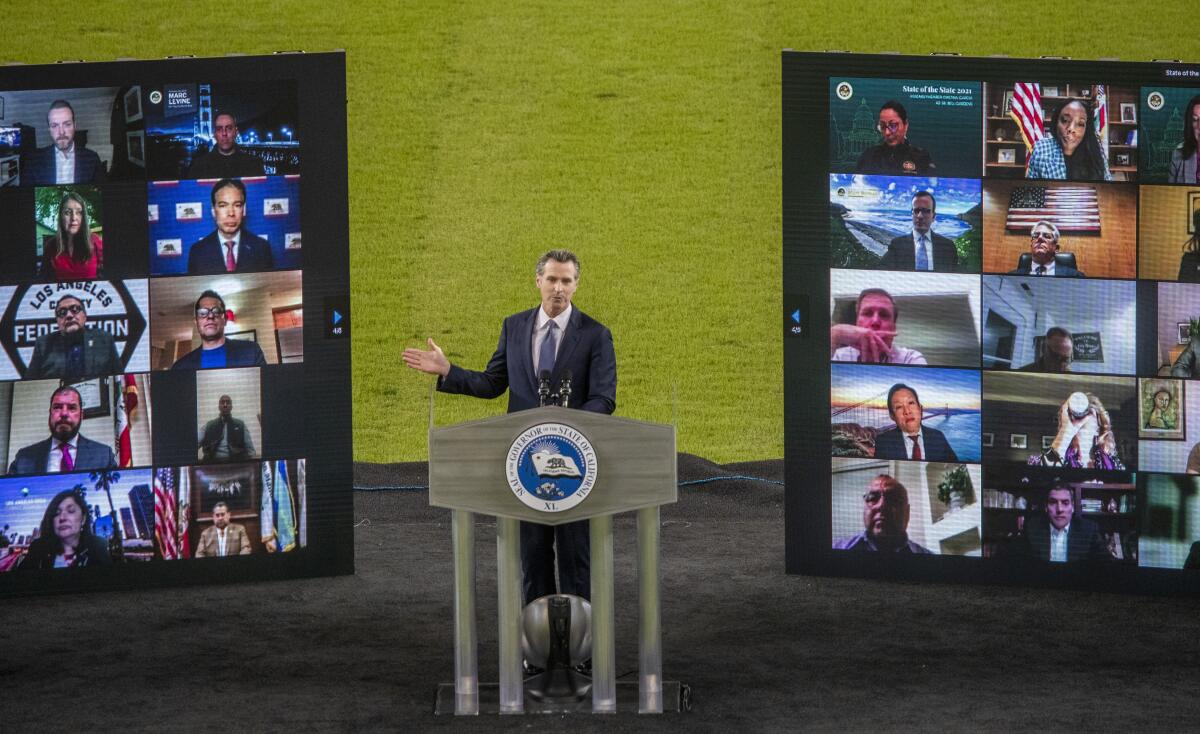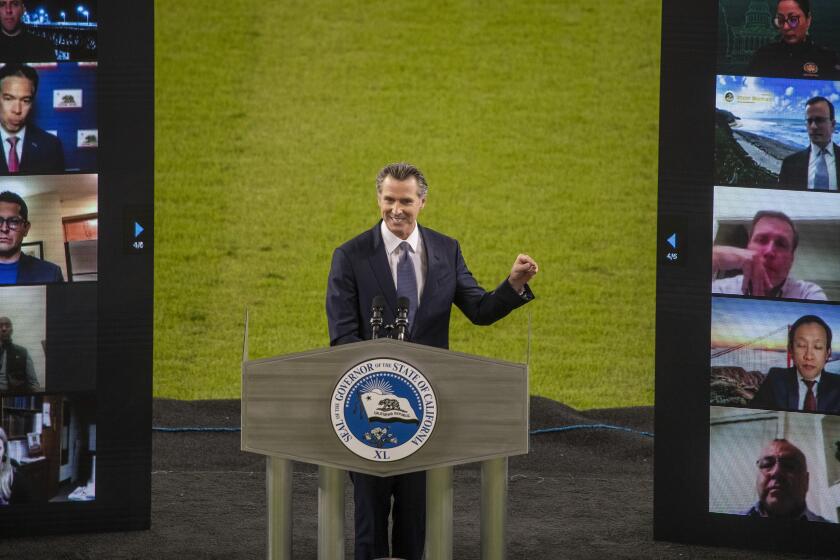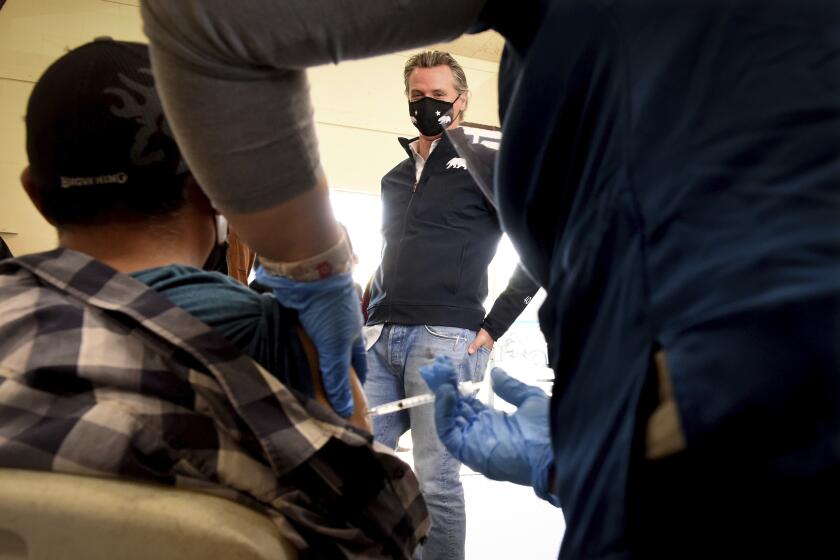Column: Newsomâs State of the State address felt like a campaign kickoff to sink the recall effort

SACRAMENTO â Whatever that was in Dodger Stadium on Tuesday night, it definitely was not a State of the State address.
The player was way out of position.
It doesnât matter what Gov. Gavin Newsom and Democratic leaders thought or pretended.
The event would have been credible if it had been called what it was: the official kickoff of the governorâs campaign to beat the Republican-led effort to recall him. And it should have been delivered at a political rally or Democratic convention.
Or he could have legitimately called it a first anniversary report on Californiaâs handling of the deadly COVID-19 pandemic. And detailed how weâre gradually moving toward recovery, medically and financially. Not quite âHappy Days Are Here Again,â but âHere Comes the Sun.â
Newsomâs highly orchestrated event, however, ended with the song featured in his 2018 campaign commercials: âCalifornia Stars.â
State of the State?
What if President Biden delivered a State of the Union address from Yankee Stadium in New York? No one in the stands. No âMadam Speaker, the president of the United States.â Heâd be jeered across America louder than umpires before instant replay.
Yankee Stadium would make as much sense as Dodger Stadium.
The governor emphasized his administrationâs work to respond to challenges that âmade the unthinkable commonplaceâ over the last year and pledged to address deep-rooted inequities further exposed by the pandemic.
Legislative leaders justifiably called off the normal State of the State trappings because they feared the Assembly chamber could become a superspreader of the coronavirus if a joint session of both houses was crammed into the historic hall. Fair enough.
But if that happened in the nationâs capital, my guess is the State of the Union would be held at an alternative D.C. site, such as the Kennedy Center or the Washington Wizardsâ basketball arena.
Sacramentoâs Memorial Auditorium would have easily accommodated the lawmakers with ample distancing. Legislative leaders suggested the Sacramento Kingsâ Golden 1 Center. But Newsom nixed it.
The governor and his advisors decided that if the annual address wasnât going to be held in the Capitol, heâd do it virtually â from Dodger Stadium.
The stadium is in the heart of the stateâs largest TV market where more voters were certain to view his speech, Newsom theorized. He could feature the nurses and other healthcare workers injecting people at what has become a mass vaccination site. And the empty seats could symbolize the more than 54,000 Californians who have died of COVID-19.
âThatâs almost the same number of empty seats behind me, marking a silent tribute to loved ones who live forever in our memories,â Newsom said, looking into the TV camera just off the warning track in deep center field.
I liked what Sacramento Bee Editorial Page Editor Gil Duran wrote about that. Duran is also a former spokesman for several major Democratic officeholders.
The governorâs address came after the EDD said its backlog of delayed, unapproved claims has doubled since the start of the year to more than 1 million.
âAs someone who has written many speeches for many politicians,â Duran wrote, âI know you never want the boss speaking to an empty room, much less a stadium with 54,395 imaginary dead people.â
The whole show just did not connect with how it was billed.
Newsom was flanked by panels of faces in squares â healthcare workers? It wasnât explained â that periodically were flashed on TV alongside him as he spoke. That surely distracted viewers from the governor.
And he was out of uniform for a baseball field, standing on green grass in a dark blue suit with white shirt and tie. Thatâs the appropriate outfit for a State of the State address to a joint legislative session. This event called for his favorite attire: jeans and a fleece jacket.
It didnât mesh.
âThe âState of the Stateâ gimmick was probably not necessary,â says Dan Schnur, a USC and UC Berkeley political science lecturer who was former Republican Gov. Pete Wilsonâs spokesman.
âA speech on COVID will get on TV in Los Angeles no matter where a governor gives it. And he canât afford to alienate the Legislature by snubbing it on what would be their moment in the spotlight.â
Democratic consultant Steve Maviglio, who was Gov. Gray Davisâ spokesman when he was recalled in 2003, called the event âoverproduced and seemingly over-rehearsed.â
Before the speech, Maviglio, who is also a former legislative advisor, told me: âIâm a traditionalist. I think it cheapens the State of the State a bit.
âThere are two audiences for a State of the State: the Legislature and the public. I donât know how he takes care of the Legislature, whose relationship with him is pretty rocky. For legislators, itâs the highlight of the year, really.â
âItâs bad enough that itâs in the middle of March,â Maviglio added.
Helping to unlock baseball stadiums as season openers approach is guaranteed to be popular and bipartisan.
Before Newsom, governors always punctually delivered the annual address in January, outlining agendas for the year ahead. Newsom delayed his first two until February. Now he has dragged the third into pre-spring.
The conventional analysis is that Newsom waited until there was better news to report on COVID-19 â and timed the speech to coincide with when recall sponsors are ready to submit enough voter signatures to presumably qualify their effort for the ballot.
But I think the main cause of Newsomâs March delay was disorganization.
The speech itself was so-so.
For me, it was a little too much rah-rah happy talk for the still scary situation. You canât speed voters into feeling joyful when people continue to die and businesses close.
You can read all about what Newsom said in The Timesâ speech coverage.
What Iâm saying is that whatever the virtual show might be called, it didnât look real.
The former college pitcher committed an error.
More to Read
Sign up for Essential California
The most important California stories and recommendations in your inbox every morning.
You may occasionally receive promotional content from the Los Angeles Times.













